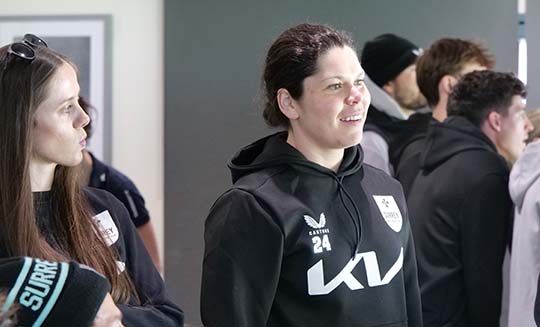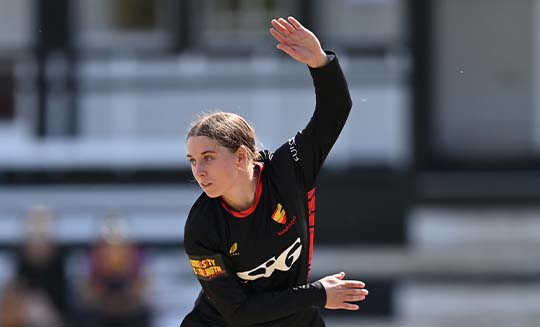Future Planning for Tom Harrison Tom Harrison, the new chief executive officer of the England and Wales Cricket Board, knows all about the PCA and the good work that the Association does for its members. Harrison has been a PCA member for more than 21 years from his playing days as an all-rounder for Northamptonshire and Derbyshire. Like many junior professionals, his county career proved to be relatively short and he played only one season of first team cricket in the mid-nineties. But after he was released by Derbyshire in 1995 the PCA helped him make the transition from county cricket to business – and embark on a hugely successful career path which led to him being appointed as David Collier’s successor as ECB CEO last year. ” There were no Personal Development Managers when I played for Northamptonshire and Derbyshire. The PCA had a small staff then but they did help me write my first CV and find a new career outside of cricket,” Harrison says. Since Harrison’s professional playing career ended, the PCA has expanded to a six-strong team of PDMs now employed across the country to help players plan for life outside of cricket. First year professionals are made aware of the importance of personal development from an early stage as Harrison saw at first hand when he attended the PCA’s fifth annual Rookie Camp at Edgbaston in late February. ” With ECB’s help and support, the PCA is doing more than ever before in this area – and rightly so,” says Harrison. ” It has also played a critical role in tackling and improving our understanding of issues such as addictive behaviour and mental health. There is still much to do but we are now better prepared as a game to deal with these issues.” The organisation has an important role to play in helping prepare cricketers for the transition from cricket into the workforce. As Harrison himself acknowledges, it can be intimidating when you are faced with the reality of your cricketing career coming to an end and have to compete in the job market with potentially younger and better academically qualified graduates. So on their first day of their journey into the professional game, those who attended the Rookie Camp, were strongly encouraged to keep one eye on the future. ” Professional Cricket is an amazing start to a career,” adds Harrison. ” If you have played first-class cricket it is still a huge advantage in life. Just to have reached that level shows leadership and the ability to perform in a high pressure environment.” The Rookie Camp was also attended by Mervyn Westfield, the former Essex fast bowler who was jailed for his involvement in spot-fixing but who is now playing an important role in helping to combat in corruption in cricket. ” There is no greater threat to our game than corruption pervading a dressing room. It breaks down the fundamental pillars of what sport is about. We are taking steps and we are more prepared than we have ever been to tackle corruption but I don’t think we should ever be complacent,” Harrison says. ” The forces that try to corrupt cricket and other sports are always developing new and inventive ways of undermining our game for their own benefits. We are vulnerable to that and we must seek to become more sophisticated in the way we deal with corruption and in our techniques of investigation. We must be proactive in gaining intelligence from the market and understanding where the threats are coming from.” Harrison was full of praise for Westfield’s role in educating players about the dangers. ” I don’t think there is anything more effective than a live example of what can happen when someone gets caught up in corruption. ” Mervyn’s willingness to participate is very important and it has taken a great deal of courage on his part as he has been through a very hard time in his life. ” It’s also a great example of how the cricketing family is willing to put their arms around someone who has done the wrong thing and who is now prepared to remedy things for the future. ” Harrison, who joined the ECB from IMG, is still settling into his new role but he has already been tasked with reviewing the structure of domestic cricket in England and Wales. ” My first weeks as ECB’s chief executive officer have been hugely busy. It’s vitally important that we create a dynamic structure for our professional game which will widen our audience and deliver a high performance environment. ” This is our key job: to grow the game. My role is to create an environment in which everybody can feel that they are welcome in the game, that they have an opportunity to play. We need more people playing, more people watching, more people following and more people engaged in cricket. ” That doesn’t just mean our core audience but our non-core audiences as well. The people we aren’t engaging with enough. We need to change the nature of the conversation. It needs to be a dialogue not a one-way broadcast.” As a key stakeholder in the game the PCA will be a key part of the consultation process which will include gauging the views of current and former players from all levels. Harrison adds: ” We are in the process of creating several working groups to drive thinking on different parts of the game including professional cricket, the international game, the culture of our organisation, grassroots participation and how we generate more commercial revenue for the sport.” As a former captain of Middlesex Premier League side Teddington CC – Harrison has a clear understanding of the challenges cricket faces at amateur level as well as in the professional game. Widening grassroots participation is a major priority for ECB and Harrison acknowledges that cricket faces stronger competition from other sports than it has done in the past and needs to adapt accordingly. ” We are not necessarily making it easy for people to participate in cricket. There are so many other leisure options out there now that we can no longer take it as read that the majority of people will have the same passion for the game that our generation has had.” ” There’s work to do. We have to look to the future and make sure that we bring through the next generation of players, spectators and cricket followers who will sustain the sport going forward. ” But I am absolutely confident that with strong leadership from the top and the right strategy in place, we can make the whole game even stronger and more attractive to a wider audience than ever before.” {{ak_sharing}}
By completing this form you consent to receive updates and promotions. Unsubscribe anytime. See our Privacy Policy for details.












